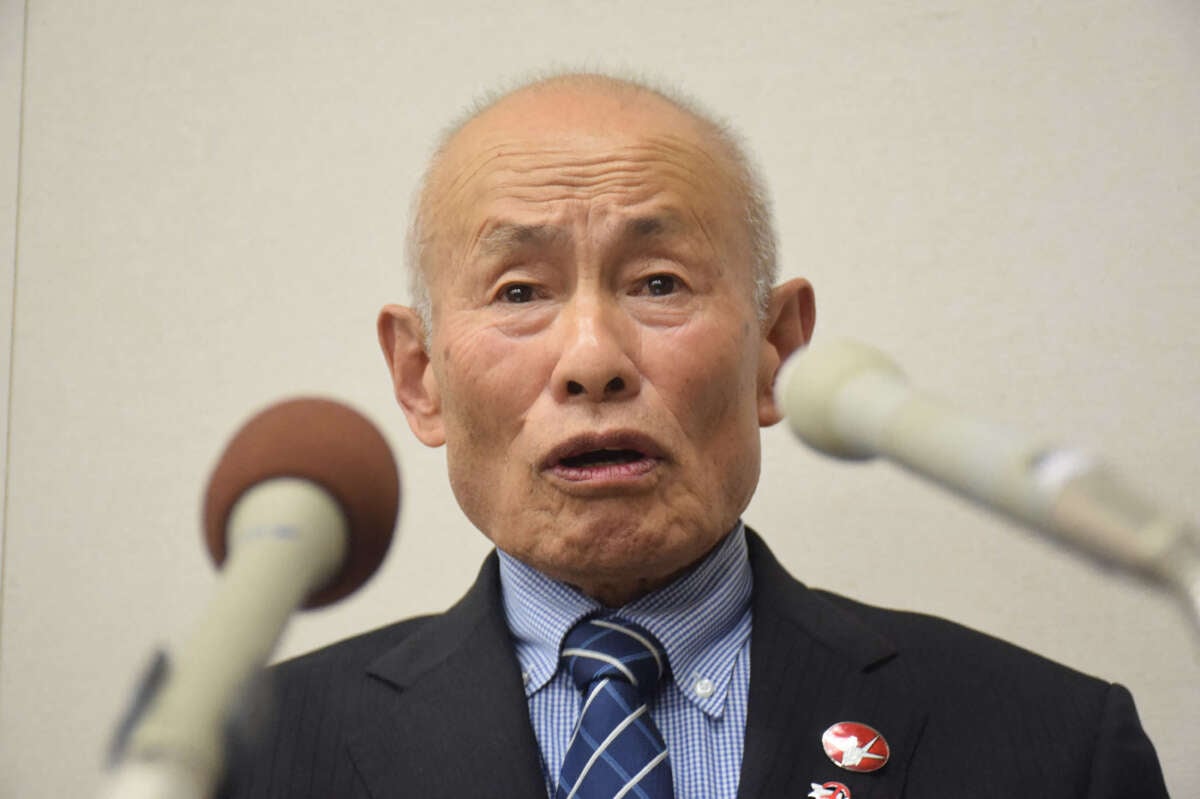Truthout is a vital news source and a living history of political struggle. If you think our work is valuable, support us with a donation of any size.
Calling for peace in war zones around the world and an end to the proliferation of nuclear weapons, a grassroots group organized by survivors of the United States’ atomic bombing of Hiroshima and Nagasaki in 1945 was awarded the Nobel Peace Prize on Friday.
Nihon Hidankyo was established in 1956 after a number of local organizations of hibakusha, the Japanese name for “bomb-affected people,” joined together.
Toshiyuki Mimaki, the group’s leader, was three years old when the U.S. killed 100,000 people in Hiroshima with a nuclear weapon, and his message after learning Nihon Hidankyo was the 2024 Peace Prize winner was straightforward.
“I am not sure I will be alive next year,” said Mimaki, 82. “Please abolish nuclear weapons while we are alive. That is the wish of 114,000 hibakusha.”
Mimaki focused not only on the plight of the estimated 650,000 Japanese people who survived the Hiroshima and Nagasaki attacks, but also people — particularly children — facing war now.
“It has been said that because of nuclear weapons, the world maintains peace. But nuclear weapons can be used by terrorists,” said Mimaki. “For example, if Russia uses them against Ukraine, Israel against Gaza, it won’t end there. Politicians should know these things.”
“In Gaza, bleeding children are being held [by their parents],” he added. “It’s like in Japan 80 years ago.”
Mimaki said he had believed “the people working so hard in Gaza” would be awarded the Peace Prize, referring to the United Nations Relief and Works Agency for Palestine Refugees in the Near East (UNRWA), which was also nominated.
The U.N. agency has struggled to continue providing humanitarian services to Palestinians in Gaza this year after unverified claims by Israel that 12 UNRWA workers were involved in a Hamas-led attack last year prompted countries including the U.S. to suspend its funding. A majority of countries — but not the U.S., the agency’s biggest donor — have restored funding after an independent probe found Israel had not provided evidence for its accusations.
Kazumi Matsui, the mayor of Hiroshima, said that with the average age of hibakusha now 85, “there are fewer and fewer people able to testify to the meaninglessness of possessing atomic bombs and their absolute evil.”
“People in coming generations must know that what happened is not just a tragedy for Hiroshima and Nagasaki, but one that concerns all humanity that must not be repeated,” said Matsui.
The International Campaign to Abolish Nuclear Weapons (ICAN), which won the Nobel Peace Prize in 2017 for its efforts to ensure countries comply with the U.N. Treaty on the Prohibition of Nuclear Weapons, applauded the Nobel Committee for recognizing Nihon Hidankyo’s “lifelong work to bring the world’s attention to what nuclear weapons actually do to people when they are used.”
Several years after the nuclear bombings, rates of leukemia diagnoses rose considerably in Japan among survivors. After a decade, other cancers were also detected at higher-than-normal rates. Pregnant women who were exposed to radiation from the bombings also had higher rates of miscarriage and their infants were more likely to die.
Cancer rates have continued to increase among hibakusha throughout their lives.
“It is particularly significant that this award comes at this time when the risk that nuclear weapons will be used again is as high, if not higher, as it has ever been,” said Melissa Parke, executive director of ICAN.
As Nihon Hidankyo was honored “for its efforts to achieve a world free of nuclear weapons and for demonstrating through witness testimony that nuclear weapons must never be used again,” the North Atlantic Treaty Organization (NATO) announced it would be holding its annual nuclear exercise, “Steadfast Noon,” on October 14 over Western Europe.
On Democracy Now! on Friday, Joseph Gerson, president of the Campaign for Peace, Disarmament, and Common Security, said the award “could not come at a better time.”
“What most people don’t understand is the increasing danger of nuclear war at this point,” said Gerson. “Among all the nuclear powers, the threshold for nuclear use is decreasing, and all the nuclear powers are in the process of so-called ‘modernizing’ their nuclear arsenals. This is a very dangerous moment.”
“We must, as the hibakusha say, recognize that human beings and nuclear weapons cannot coexist,” Gerson added, “and we have to work for their abolition.”
A terrifying moment. We appeal for your support.
In the last weeks, we have witnessed an authoritarian assault on communities in Minnesota and across the nation.
The need for truthful, grassroots reporting is urgent at this cataclysmic historical moment. Yet, Trump-aligned billionaires and other allies have taken over many legacy media outlets — the culmination of a decades-long campaign to place control of the narrative into the hands of the political right.
We refuse to let Trump’s blatant propaganda machine go unchecked. Untethered to corporate ownership or advertisers, Truthout remains fearless in our reporting and our determination to use journalism as a tool for justice.
But we need your help just to fund our basic expenses. Over 80 percent of Truthout’s funding comes from small individual donations from our community of readers, and over a third of our total budget is supported by recurring monthly donors.
Truthout has launched a fundraiser to add 379 new monthly donors in the next 6 days. Whether you can make a small monthly donation or a larger one-time gift, Truthout only works with your support.
